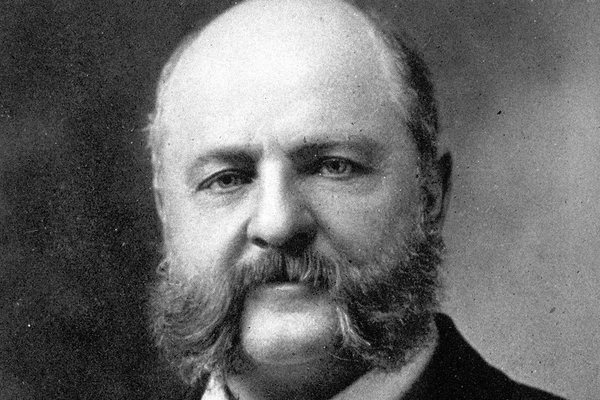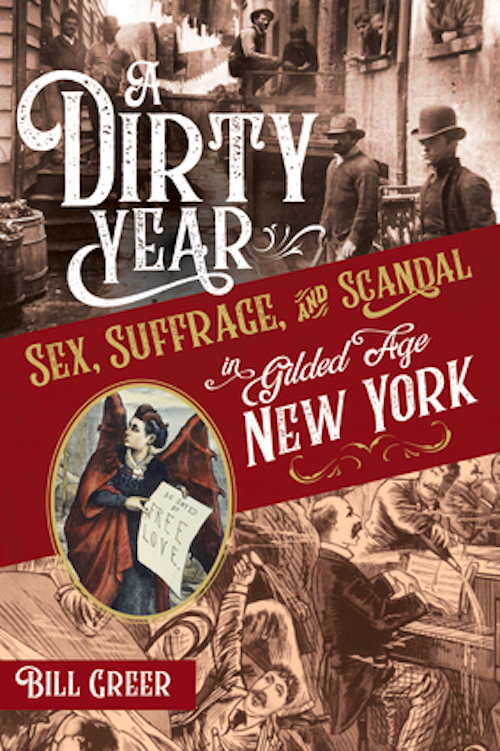Texas Judge Revives Anthony Comstock's Crusade Against Reproductive Freedom

In April, a Texas judge ruled invalid the Food and Drug Administration’s approval of a pill used in over half the abortions in America. Going further, he invoked the federal Comstock Act to declare it “nonmailable.” Twenty Republican Attorneys General promptly warned pharmacy chains to halt its sale. Such sales would violate a law initiated 150 years ago by a Connecticut farm boy turned dry goods salesman beginning his battle against reproductive rights.
From an early age, Anthony Comstock showed his moralistic zeal. At eighteen, he broke into a gin mill near his family’s farm and drained the liquor onto the floor. Enlisting after Gettysburg, he fought his fellow soldiers’ vices – liquor, lust, swearing, breaking the Sabbath – as vigorously as the Confederates. Moving to New York, he futilely tried to jail a smut dealer loaning obscene books to schoolboys.
The “hydra-headed monster” of smut is where he made his first big kill. On March 2, 1872, he and a police captain raided booksellers along Manhattan’s Nassau Street, the heart of America’s smut industry. In one shop, he purchased The Confessions of a Voluptuous Young Lady of High Rank. In others, he bought Women’s Rights Convention and La Rose d’Amour. Evidence in hand, the pair secured warrants from a judge who agreed the books were obscene. Returning to Nassau, they arrested eight culprits and confiscated five bushels of obscene merchandise.
Later that month, Comstock targeted a crime catering more to women, and which he considered an immeasurably greater evil. Smut merely inspired lust. This crime enabled it. His specific target was a man, Dr. Charles Manches. But the services Manches offered helped women overcome the safeguards God had built to control their passions: the fear that could make a woman on the brink stop and preserve her chastity.
Manches advertised his “French Imported Male Safes” as “a perfect shield against disease or conception.” For ladies wishing to take matters into their own hands, he offered “Ladies Protectors,” commonly known as womb veils. If those devices failed to prevent pregnancy, he promised “Ladies Cured at One Interview, with or without medicine, $5.” He was one of over a hundred abortionists in the city, according to the New York Times.
With support from the YMCA, Comstock continued his raids. By mid-year, he had eight smut cases pending in New York courts. But prosecutors continually requested postponements. When one case finally proceeded, the defense didn’t contest Comstock’s testimony. It simply argued the material confiscated was no more obscene than passages in the bible. The argument wasn’t convincing. Ten jurors voted to convict. But the two who didn’t meant the defendant walked. That proved the best outcome of his pending cases.
Frustrated under state law, Comstock changed tactics. Seven years earlier, Congress had banned obscenity from first class mail. The law was weak, narrowly defining obscenity and prohibiting postmasters from unsealing mail even if they knew a piece contained it. Prosecutions had barely hit half a dozen.
Comstock began ordering smut by mail. After receiving obscene goods, he obtained warrants in US Circuit Court. Four dealers were convicted and sentenced to one year in jail and $500 fines – too lenient for Comstock, but the maximum the law allowed.
Raiding one dealer’s medical associate, he discovered the doctor’s teenage patient awaiting his third attempt to abort her fetus. But abortion was a state crime. A district attorney killed that case.
Dissatisfied, Comstock outlined ideas for a tougher federal law to Morris Jessup, the YMCA’s President. Jessup got US Supreme Court Justice William Strong to finalize a bill for Congress. In February 1873, Comstock visited the US Capitol to exhibit obscenities – books, sex toys, rubber goods. Attending senators declared they would accept any bill he wanted so long as it was constitutional. They could pass it before the current session closed for President Grant’s second inauguration March 4.
New York Congressman Clinton Merriam introduced the bill in the House, expecting to pass it quickly under a suspension of the rules. Connecticut Senator William Buckingham followed in the Senate.
An optimistic Comstock got a head start on enforcement. On Treasury Department letterhead, he contacted nine suspicious doctors. “I am an employee of the Treasury,” he wrote under the pseudonym Anna M. Ray, “I was seduced about four months ago, and I am now three months gone in the family way.” “Anna” begged each doctor to send something to relieve her condition. “For God’s sake do not disappoint a poor ruined and forsaken girl whose only relief will be suicide if you fail me.”
The optimism was premature. With resisting legislators invoking rules and demanding changes, weeks passed. On Saturday evening, March 1, the House met for its final session. Comstock watched. At midnight, unwilling to break the Sabbath, he gave up. Leaving the Capitol, he spent a sleepless night too depressed even to pray. Not until dawn could he accept the failure as God’s will. Only when he ran into the Senate’s chaplain did he learn the news. “Your bill passed the House at two o’clock this morning,” the chaplain said. It was immediately sent to the Senate and passed. President Grant signed it the next day.
His bill launched Comstock’s four-decade career fighting smut dealers, abortionists, birth control advocates, artists, playwrights, and poets. Its opening section foretold his war on reproductive rights, explicitly banning anything – device, medicine, tool, information, advertising – “for the prevention of conception” or “for causing unlawful abortion.”
Women bookended that career. As he was pushing his bill in Congress, Comstock indicted “Free Lover” Victoria Woodhull and her sister Tennie Claflin for publishing an obscene article exposing the adultery of Reverend Henry Ward Beecher. While the article might have been libelous were it not true, it wasn’t obscene. But Comstock guessed the arrests would be a publicity coup that would help his bill pass. After a year of harassment, the sisters were acquitted.
Under his bill, Comstock quickly attacked abortionists—twelve in Chicago, seventeen in New York. But Chicago judges imposed trivial fines. In New York only three served serious time. Through 1875, Comstock claimed 49 abortion arrests with 39 convictions, but even he acknowledged the difficulty of bringing the practitioners to justice. In 1878, he achieved one notable feat. He entrapped New York’s notorious abortionist Madame Restell, driving her to suicide. “A Bloody ending to a bloody life,” he noted without remorse.
Months later, Comstock entrapped Dr. Sara Case. She supplied syringes for post-coital douching with substances like vinegar and carbolic acid to prevent conception. As their battle played out in the press, Case renamed her device the “Comstock Syringe.” Sales soared.
The list went on until Comstock closed his career arresting birth control advocate Margaret Sanger. She fled to Europe to escape his clutches. Comstock resorted to convicting her estranged husband for handing out a birth control pamphlet.
Of course the women he attacked directly were not the only victims of Comstock’s fight against reproductive rights. Others were the desperate women forced to bear children, no matter the risks to their health, their inability to support another baby, or simply satisfaction with the family they already had.
With the Texas judge’s decision stayed and appeals underway, the battle over reproductive rights continues in Anthony Comstock’s shadow.
